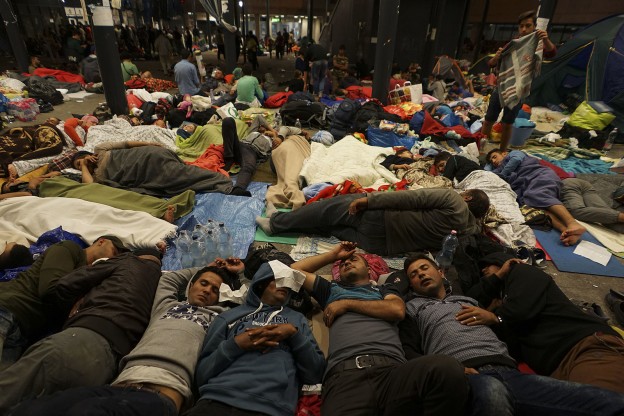EU Cracks down on refugee crisis, blocking new asylum seekers, deporting others
While German chancellor Angela Merkel warned against imposing a “general suspicion” on all Muslims and French Foreign Minister Jean-Marc Ayrault said that welcoming refugees was “a duty of solidarity,” many European countries are cracking down on their refugee programs.
At least 12,472 refugees and migrants have arrived on Europe’s shores since the beginning of 2017, according to the UN refugee agency — only slightly less than the 12,587 Syrian refugees admitted by the US in all of last year.
“The year 2015 must not be allowed to be repeated,” said Austria’s Defense Minister Hans Peter Doskozil, referring to the shocking numbers in 2015, when over one million migrants and refugees in Europe in 2015. Now, governments across Europe have sought to fortify their countries’ borders with fences, walls and guards against future mass migrations.
EU leaders outlined plans to “stem the flow” of migrants traveling across the Mediterranean from Libya to Italy, and boost the ability of the EU to send people back.
“The key priority is reducing the flow without any consideration for the causes of migration,” Dr Nando Sigona, an expert in migration at Birmingham University’s School of Social Policy, told CNN. “By closing down the routes they are making people even more vulnerable to danger and violence.”
The UK government recently announced it was halting a program to resettle lone refugee children, after 350 had been brought to Britain.
Home Secretary Amber Rudd told the House of Commons the government did not want the so-called Dubs amendment to act as a “pull factor” encouraging unaccompanied minors to travel to Europe: “We do not want to incentivize perilous journeys to Europe, particularly by the most vulnerable children.”
In accordance with European Commission recommendations, from March, Germany will begin returning asylum seekers to Greece, a spokeswoman for the German Ministry for the Interior told CNN. This process was halted in 2011 due to “systemic deficiencies in the Greek asylum system.”
Pro Asyl, a German organization that advocates for the rights of refugees criticized the decision to send “more people into the miserable conditions” in Greece and condemned the transfer system as “inhumane.”
Germany also deported a second tranche of asylum seekers to Afghanistan, despite the UNHCR’s insistence that “the entire state … is affected by an armed conflict.”The European Council on Refugees and Exiles (ECRE) argues that “by carrying out these deportations, the Federal Ministry of the Interior is completely ignoring the security situation in Afghanistan.”
Italy’s chief of police, Franco Gabrielli, has called for the detention and deportation of migrants, who he blames for “instability and threats” in the country. Italy’s Interior Minister, Marco Minniti, has announced that one new detention center will be opened in every region, that asylum assessments will be speeded up, and that the ministry will double the funds available for voluntary returns.
Dutch Prime Minister Mark Rutte has adopted a zero-tolerance approach to immigrants who are unwilling to sign up to the country’s way of life, telling those who “refuse to adapt and criticize our values” to “behave normally or go away.”
In the open letter, published on his VVD party’s website, Rutte talked of the “growing discomfort” felt by Dutch people when those who have recently arrived in the Netherlands abuse the freedom that the country offers.
“We must continue to make clear what is normal and what is not normal in this country,” he wrote. “We will have to actively defend our values.”
Ivan Miskovic, from Serbia’s Commissariat for Refugees and Migration, says that migrants inj Serbia who are living in horrible depots are there because they have refused to claim asylum.
Amnesty International researcher Todor Gardos told CNN many of them are “afraid of going to the accommodation centers.”
“There is not a functioning asylum system in Serbia and many people are worried they will just be sent back to the border with Macedonia or Bulgaria, which is a real concern,” he said.
The Hungarian parliament introduced a bill on February 14 that requires the police to deport any person who is in Hungary illegally, without allowing any access to an asylum procedure, according to a written statement by the NGO The Hungarian Helsinki Committee.
The bill also requires all asylum applications to be automatically held in detention until their claim is processed, according to the NGO. The NGO describes the proposed changes as “extreme and flagrant violations of European Union asylum law.”
Slovenia’s President recently granted the country’s parliament the power “to effectively ‘close the borders’ if this was deemed necessary due to a serious threat … caused by migrations,” according to the Legal-informational centre for NGOs (PIC).
PIC says the amendment to the country’s Aliens Act means “all persons arriving irregularly and expressing an attempt for asylum would be forcefully returned without their asylum claims being heard.”
Prime Minister Miro Cerar has hinted that such measures could be introduced in the near future.
“We cannot allow a repeat of such mass migrations as we experienced earlier,” he insisted at a press conference. “Our country will help for as long as it has available capacity but then it will have to resort to other measures.”
The Polish government has proposed similar changes to those introduced by Slovenia. According to the ECRE, Poland’s draft amendments include “new provisions on border proceedings and the possibility of detention without alternatives.”
















